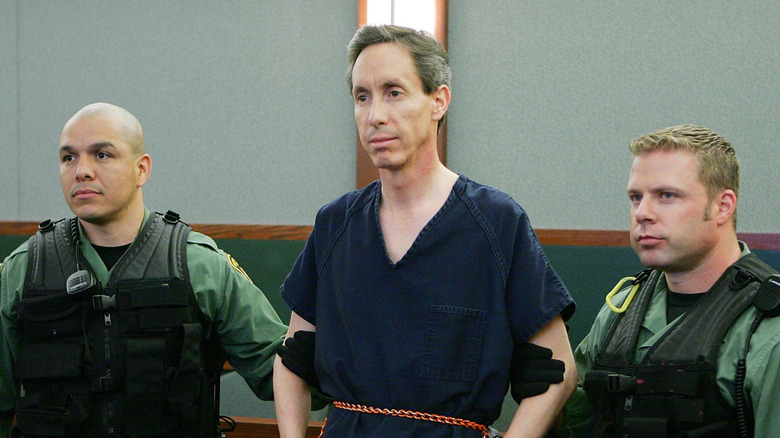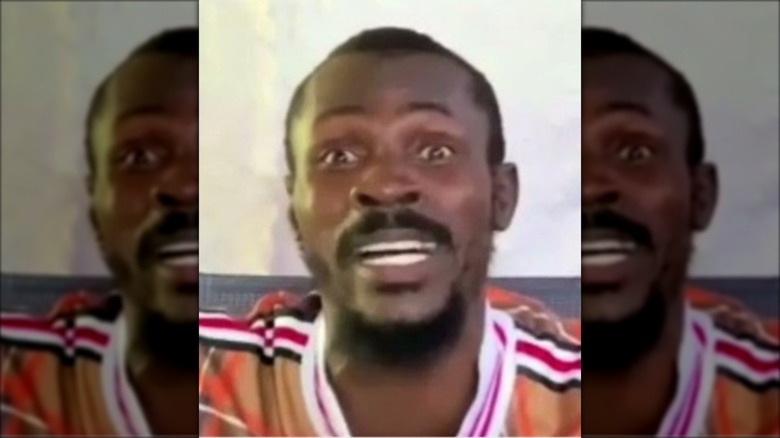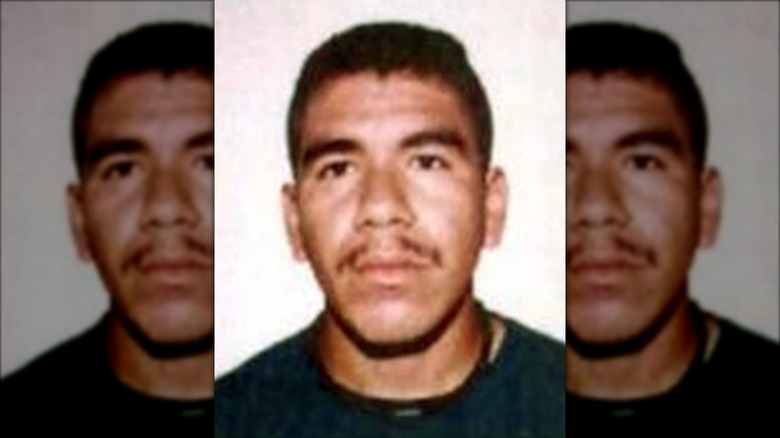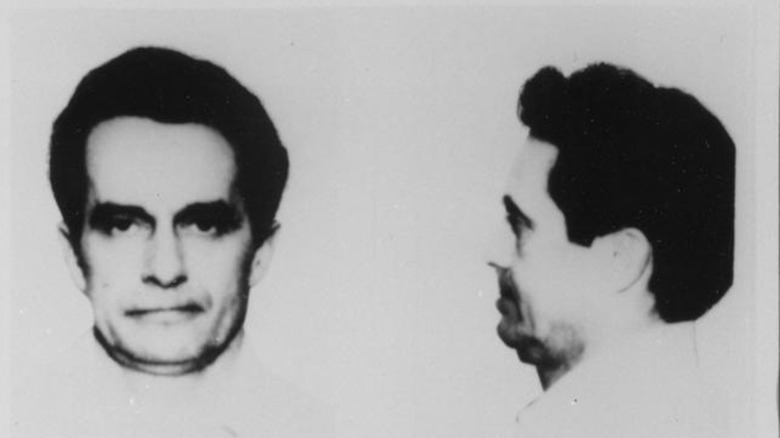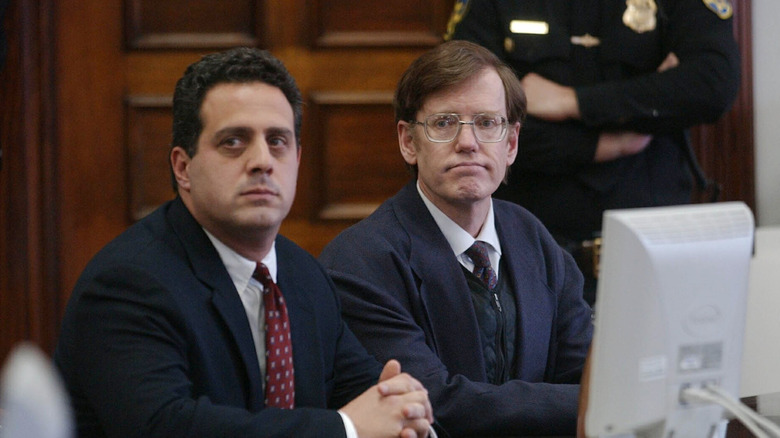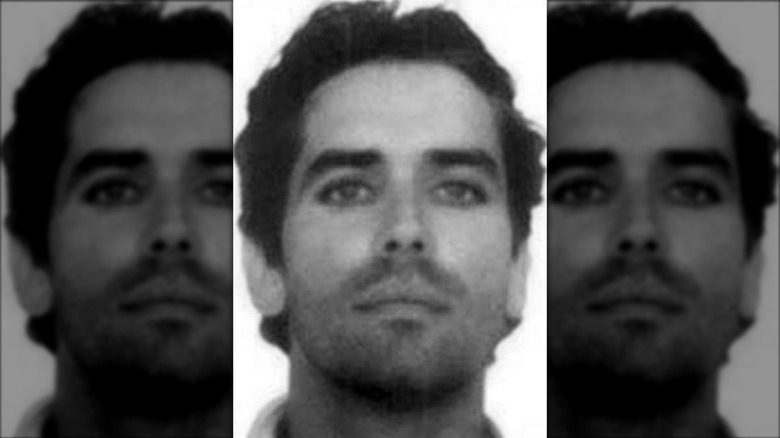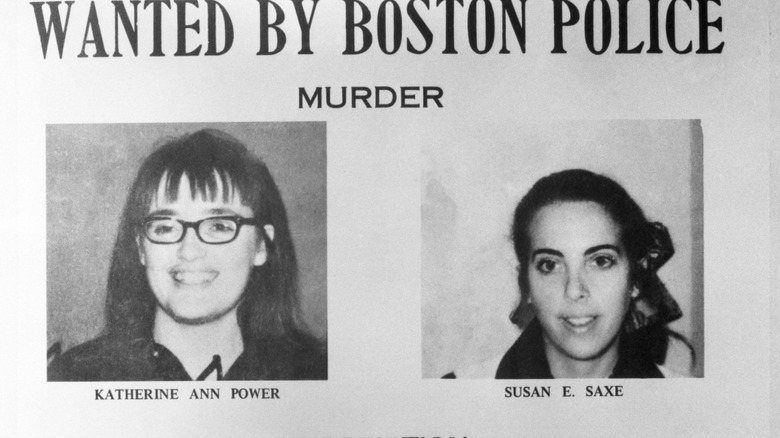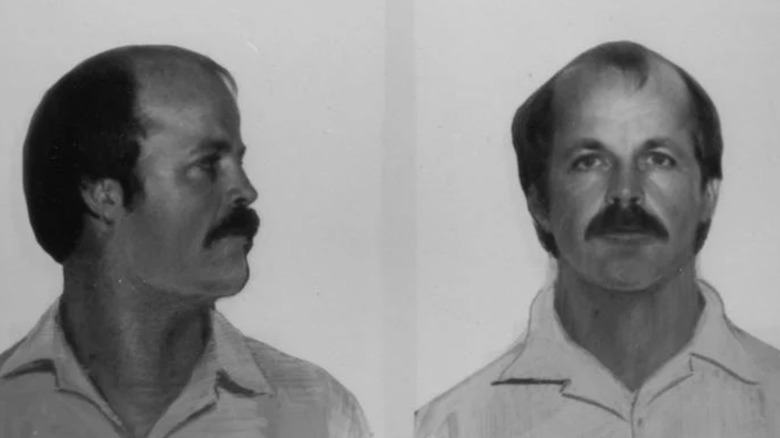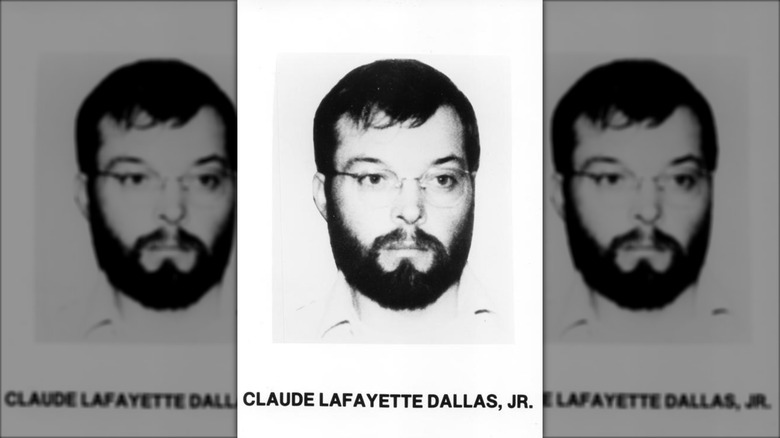What Really Happened To These Notorious Criminals On The FBI's Most Wanted List
The FBI's famed Ten Most Wanted list was the brainchild of a reporter who, looking for a story, approached the agency for a list of the "toughest guys" they were still after. The first iteration of the list was published in March 1950, and generated so much public interest that then-FBI director J. Edgar Hoover formalized a list of the ten most highly sought criminals as an official FBI publication. Since then, it has been regularly updated as fugitives are apprehended or otherwise removed, for reasons such as having died on the lam or because the Bureau chose to reallocate their slot to another case. Fugitives are chosen for the list from field office recommendations, prioritizing those whom the Bureau thinks public help (and media attention) can help find.
Murderers, terrorists, drug traffickers, and good old-fashioned swindlers have all appeared on the FBI's Most Wanted list: the closest thing American crime has to a hall of fame. As of December 2024, of the 532 people to appear on the list, 494 have been caught or otherwise located, and 163 of these were apprehended with assistance from the public — exactly the purpose of the list and its accompanying publicity.
The following article includes allegations of child abuse and sexual assault.
Vitel'Homme Innocent
Haiti, a Caribbean nation with a fascinating but frequently bleak history, has long suffered from poverty and weak internal institutions, exacerbated after a series of natural disasters in the 2010s. Armed gangs filled some of the power vacuum and have since endlessly vied for control of the capital city, Port-au-Prince, in a long-running and complex gang war. Vitel'homme Innocent heads one of the many armed factions, the Kraze Barye gang.
In 2021, the Kraze Barye gang allied with another gang, 400 Mawozo, to abduct and hold for ransom 16 U.S. missionaries and one Canadian who lived in Port-au-Prince. All of these captives (including five children) were released or escaped over the following months. In October 2022, two more Americans living in Haiti caught Innocent's eye, married couple Jean and Marie Odette Franklin. During an attempt to seize and hold the Franklins for ransom, Marie was shot and killed; Jean was held for some three weeks while his family was forced to negotiate with Innocent's group and ransom him.
Innocent was added to the FBI's Ten Most Wanted list in November 2023 for charges relating to these hostage-takings and Marie Franklin's murder. The U.S. Department of State is offering $2 million in reward money for information leading to his arrest or conviction.
Ruja Ignatova
Bulgarian-born Ruja Ignatova, alias "Cryptoqueen," conspired with others to market a fraudulent cryptocurrency called OneCoin. Ignatova and her associates piggybacked on the excitement about Bitcoin (and fortunes being made from it) to run the scam, which was structured as a multi-level marketing enterprise. But instead of leggings or essential oils, investors talked others into buying cryptocurrency, receiving commissions on funds they were able to bring in. Millions of investors (or more accurately, people who thought they were investors) put over 4 billion-with-a-B U.S. dollars worth of money into the scheme, but OneCoin was a sham: it had no blockchain of its own, nor did its prices move according to market forces, instead apparently reflecting what the scamsters wanted it to be worth.
Ignatova's partner in crime, the Anglo-Swedish Karl Sebastian Greenwood, was arrested in Thailand in 2018, ultimately receiving a sentence of 20 years in prison and $300 million in asset forfeiture for the fraud and related charges. Ignatova has not been seen since October 2017, when, one week after charges were filed against her in the United States, she flew from Sofia, Bulgaria, to Athens, disappearing after her arrival in Greece. The feds are dangling a hefty $5 million reward for information leading to her apprehension, but the well-connected and globe-trotting Ignatova — whose FBI poster has been translated into Russian, Bulgarian, Greek, Albanian, Arabic, and German — has yet to be snared.
Bhadreshkumar Chetanbhai Patel
Madonna may be the most famous former Dunkin' Donuts employee, but she's not the most infamous. That distinction goes to Bhadreshkumar Chetanbhai Patel, who is wanted for the murder of his wife Palak during their shared shift at a Maryland branch of the donut chain, owned by a relative of the couple. Bhadreshkumar and his wife are said to have argued about a possible return to India, which Palak wanted and Bhadreshkumar did not. CCTV footage indicates that the Patels went into the back of the shop, where Bhadreshkumar attacked Palak with a kitchen knife, stabbing her multiple times. News reports about the crime are not wholly consistent, but indicate that the attack occurred during working hours, with the alarm being raised when a would-be customer entered and found no one working.
Bhadreshkumar has not been sighted since shortly after the incident: he returned home for some papers, got a cab to the train station, and was last seen in Newark, New Jersey. Police posit that he was smuggled out of the United States to Canada or Ecuador, where he has family connections. The case has received interest from media outlets in the United States, in the Patels' native India, and in publications for Indians and their descendants abroad. (The reward for his capture, $250,000, is sometimes reported as 21 million Indian rupees).
Wilver Villegas-Palomino
Colombia's history as an independent nation has included far more than any one country's fair share of violence. Eight civil wars have been fought since independence, not including local conflicts, coups, and two wars with neighboring Ecuador. The current relatively low-level conflict has been ongoing since the mid-1960s. Huge progress was made in 2016 when a peace agreement was signed between the Colombian government and the most prominent rebel group, FARC (Fuerzas Armadas Revolucionarias de Colombia or, in English, the Revolutionary Armed Forces of Colombia). Unfortunately, this triumph has been marred by the emergence of other armed groups, which are either unhappy with the peace or hoping to benefit politically or economically from the power vacuum FARC left behind. One of these groups is the narcoterrorism paramilitary organization ELN (Ejército de Liberación Nacional, translated as the National Liberation Army), and one of its key members is Wilver Villegas-Palomino, aka Carlos el Puerco (Charles the Pig).
According to the FBI, narcotics produced in laboratories under Villegas-Palomino's control in northeastern Colombia are smuggled into the U.S. for sale, potentially comprising nearly 80% of cocaine imports into the United States. These profits then return to Colombia to finance the ELN. This drug trafficking and associated money laundering, weapons trafficking, kidnappings, and murders have earned El Puerco a $5 million bounty for his capture. Politically, negotiations between the Colombian government and the ELN collapsed in September 2024; leaders of the group, potentially including Villegas-Palomino, are thought to be hiding in Cuba or Venezuela.
Donald Eugene Webb
In December 1980, jewel thief and mob affiliate Donald Eugene Webb committed the first murder in the history of the small town of Saxonburg, Pennsylvania. Police chief Gregory Adams pulled over a car with out-of-state plates in a feed store parking lot; the driver shot him twice, leaving Adams dying but able to call in the attack. The killer had left quite the piece of evidence, however: a driver's license. It was fake, but it was enough for investigators to track the phony identity back to Webb. The car was found ditched in Rhode Island 17 days later, but with no Webb to be seen. He was placed on the Most Wanted List in 1981, and in late 1999 became the contemporary record-holder for longest time on the list.
In 2017, the truth emerged: Webb had been badly injured in the struggle with Adams and had entered a hospital under an assumed name. Once he was able, he returned home to New Bedford, Massachusetts, where his wife Lilian hid him in a basement room for almost two decades, even successfully moving to a new house without Webb being seen. In 1999, Webb died of a stroke; with the help of a Tupperware storage container, Mrs. Webb dragged the corpse outside and buried it.
The FBI unearthed the remains in 2016, and later news reports gloated that while Webb escaped the courtroom, the shattered leg and torn lip that Adams gave him led to pain and disfigurement that may have served as a measure of vengeance.
James Charles Kopp
During the 1990s, the United States' seemingly eternal public debate over abortion was horrifically punctuated by a series of high-profile attacks, some fatal, against abortion clinics and providers. Among these was the murder in October 1998 of Dr. Barnett Slepian, a Buffalo-area abortion provider who was shot through the window of his home shortly after returning from his father's funeral, an attack witnessed by his wife and one of his sons. The killer, James Charles Kopp, fled justice via Mexico and Ireland before hiding in France, where he was arrested while waiting for a package at a local post office.
Kopp, who is also a suspect in several attacks on abortion providers in Canada, was sentenced to 25 years in prison for the murder, plus another life sentence with an additional ten years for associated federal charges. Kopp has appealed these sentences several times and reacted to the overturn of Roe vs. Wade with another, arguing that the overturn of the historical legal precedent allowing Americans to receive abortions indicates that there was never a right to the procedure. For good measure, he additionally posits that he was not allowed to mount a defense based on the grammatically and legally complicated "humanity of womb children" (via the Democrat and Chronicle).
Glen Stewart Godwin
In 1987, Glen Stewart Godwin escaped from California's Folsom State Prison (of Johnny Cash album fame, among other notorieties), where he was serving time for robbery and murder. Supposedly, former cellmate Lorenz Karlic had set up an escape route for Godwin, cutting bars that closed off a storm drain and marking the route away from the prison with arrows and a smiley face. (The former cellmate was rearrested and died by suicide in custody, so there's no testimony to flesh out the physical evidence.) In addition to the ill-fated former cellmate, Godwin's wife Shelly was sought for questioning and subsequently arrested, on the basis of some conveniently timed absences from work and car rentals in San Jose and Sacramento.
Godwin, fluent in Spanish, made like many an American fugitive and went to Mexico. There, he was arrested on drug trafficking charges, only to murder a fellow inmate and escape again in 1991, this time under murkier circumstances whose details haven't made it into publicly available reports. Godwin hasn't been reliably spotted since, though suspected sightings are regularly reported.
Katherine Ann Power
In the history of the Most Wanted List, only eleven women have been so honored. Of these eleven women, three studied at Brandeis University: Black activist Angela Davis, along with Susan Edith Saxe and Katherine Ann Power, the latter two being anti-war activists who went too far. Saxe and Power were angry about U.S. involvement in the Vietnam War (as many people were), and in the fall of 1970 the women, along with Power's ex-con boyfriend Stanley Raye Bond and two criminals Bond knew, decided to rob a bank and give the money to the Black Panthers, whom they believed would use it to overthrow the government. One of the conspirators, William Gilday, shot responding officer Walter Schroeder in the back, killing him.
The men were caught quickly, but the resourceful duo Saxe and Power were able to evade capture long enough to reach the Most Wanted list. Saxe was snagged in 1975 and later pleaded guilty to manslaughter, but Power remained on the lam for 23 years, living in Oregon as a restaurateur named Alice Metzinger. She ultimately negotiated her surrender to Massachusetts authorities through go-betweens and pleaded guilty to reduced charges, receiving eight to 12 years for the robbery and murder. Power also received a concurrent five-year sentence on federal charges, related to the fact that the weapons used in the heist had been stolen from a National Guard armory. A provision of her plea deal forbids her or her family from writing or speaking of her crimes for pay.
Christopher Wilder
Australian-born serial killer Christopher Wilder became known as the "Beauty Queen Killer" because one of his probable victims, Elizabeth Kenyon, had been a finalist in the Miss Florida pageant, and because of his favored ruse to get women to trust him by offering to take modeling photographs of them. After a series of sexual assaults in the United States and Australia occurring from the late 1960s to the early 1980s, Wilder began a terrifying murder spree in February 1984, abducting at least 12 women and killing nine or more. When New Hampshire State Police spotted Wilder a mere 10 miles from the Canadian border, they moved to bring him in; during the struggle, Wilder fired his .357 Magnum handgun twice, striking himself both times and dying almost immediately.
Wilder's violent spree had been ended, thankfully, but as with many predators, questions remain about the true tally of his victims. The Palm Beach Post identifies a number of women who disappeared or were murdered in the time Wilder lived in Florida, with some sets of remains found near his land and others with known links to the killer. Sadly, with Wilder dead, these women and girls' fates may never be known with certainty.
Claude Dallas
Claude Dallas was spending the winter of 1980-1981 as a "mountain man" in rural Idaho, living off the land and off the grid. The Virginia-born outdoorsman was known for his short temper, having beaten animals and livestock that annoyed him, and was also notorious for poaching and over-trapping, paying little attention to laws or common sense around conservation. When two Idaho Fish and Game officers, Bill Pogue and Conley Elms, responded to concerns about Dallas' activities, he shot them dead and bolted. After over a year on the run, he was captured in a brief firefight in Nevada and returned to Idaho for trial.
Two holdout jurors who believed Dallas' story of fearing for his life meant that he was acquitted of first-degree murder, despite Elms' having been shot in the back. Instead, two counts of voluntary manslaughter and a gun charge sent him away for nearly 25 years. However, Dallas escaped prison in May 1986 and went on the run for almost a year before his recapture in 1987, which earned him a spot on the FBI Most Wanted list.
While Dallas himself refused interviews during his prison term, he was lionized by a section of the American public who saw him as an outlaw hero. Dallas' story inspired songs, a made-for-TV movie, and a claque of groupies who attended his trial and called themselves the Dallas Cheerleaders, but the man himself has stayed out of headlines since his 2005 release.
Brenda Delgado
Brenda Delgado is one of the few women to make it onto the FBI Most Wanted List, but she didn't spend much time there, having been captured just two days after being added. The pretty, sweet-natured (up to a point, apparently) dental assistant had been dumped over email by boyfriend Ricky Paniagua, who preferred pediatric dentist Kendra Hatcher. Delgado played it cool, remaining friendly with Paniagua, but began asking acquaintances if they knew anyone who could hurt Kendra ... or worse. Delgado's friend Crystal Cortes needed money, so for $500 she joined Delgado in the hunt for a hired killer. They found a pot dealer named Kristopher Love, who agreed to carry out the hit for $3,000 in drugs and cash.
On September 2, 2015, Cortes drove Love to Hatcher's work in a borrowed Jeep Cherokee; he killed Hatcher with one shot and stole her purse. The car was spotted on CCTV, Cortes folded quickly under questioning, and her phone led police to Love. Delgado hopped on a bus to her native Mexico and hid with family in Torreón, Coahuila. She was peacefully apprehended, extradited to Texas, and convicted of first-degree murder by a jury that needed only 20 minutes to do so. Delgado is currently serving life without parole.
Warren Jeffs
When the main Church of Jesus Christ of Latter-Day Saints reversed course to ban polygamy in 1890, a number of groups split off to continue the practice. One of these, the Fundamentalist Latter-Day Saints or FLDS, grew to encompass a criminal conspiracy of child marriage, sex trafficking, and abuse under the leadership of prophet and pervert Warren Jeffs. Jeffs, who molested his own daughters and counted minors among his dozens of wives, ruled his cult with an iron fist, ostensibly deciding who went to heaven while ejecting young men to free up more women for him and his cronies.
Jeffs was added to the Most Wanted List in 2006 for facilitating marriages between children and adults, though the list of charges grew as the investigation continued. He was caught that August in a traffic stop near Las Vegas, with a suspicious cargo of wigs, cell phones, and cash. His initial guilty verdict was overturned, but new charges for — yet again –marrying more children brought him back to court. He's serving life plus 20 years, though critics fear Jeffs is still calling the shots for the FLDS from behind bars.
If you or anyone you know may be the victim of child abuse or has been a victim of sexual assault, contact the relevant resources below:
-
The Childhelp National Child Abuse Hotline at 1-800-4-A-Child (1-800-422-4453) or contact their live chat services.
-
The Rape, Abuse & Incest National Network website or contact RAINN's National Helpline at 1-800-656-HOPE (4673).
